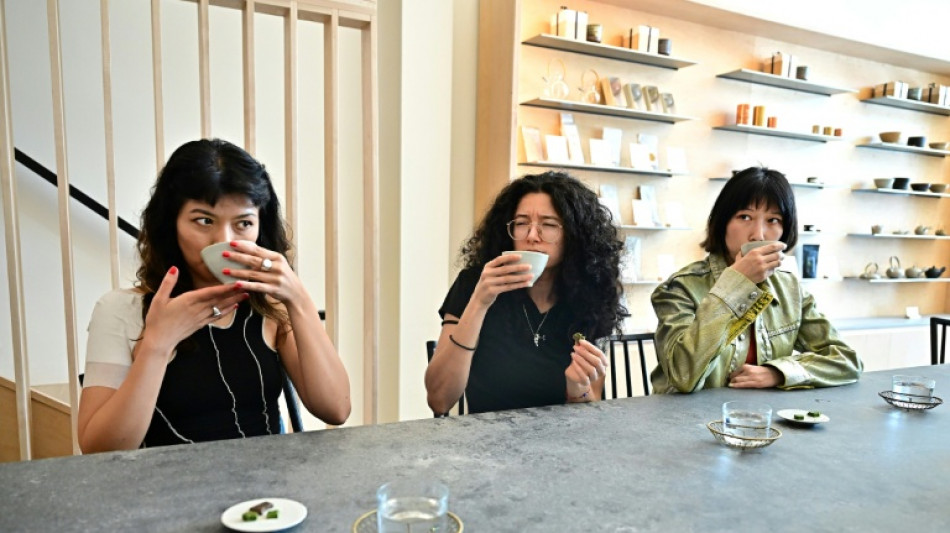
-
 US lawmakers set for explosive vote on Epstein files
US lawmakers set for explosive vote on Epstein files
-
Gianfranco Rosi: the slow documentary maker in a frantic world

-
 P.Priime, Nigeria's young leading Afrobeats producer
P.Priime, Nigeria's young leading Afrobeats producer
-
Merz, Macron to push for European digital 'sovereignty'

-
 Trump hosts Saudi prince for first time since Khashoggi killing
Trump hosts Saudi prince for first time since Khashoggi killing
-
Tonga's Katoa out of NRL season after brain surgery

-
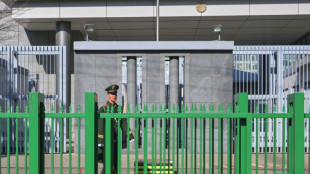 Japan warns citizens in China over safety amid Taiwan row
Japan warns citizens in China over safety amid Taiwan row
-
In Somalia, a shaky front line barely holds back the 'dogs of war'

-
 Shares in 'Baby Shark' studio jump on market debut
Shares in 'Baby Shark' studio jump on market debut
-
Thunder breeze past Pelicans, Pistons overpower Pacers

-
 Grieving Cowboys remember Kneeland, defeat Raiders
Grieving Cowboys remember Kneeland, defeat Raiders
-
Loaf behind bars: Aussie inmate says Vegemite a human right
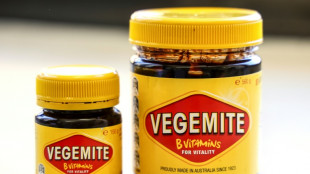
-
 In film's second act, 'Wicked' goes beyond Broadway musical
In film's second act, 'Wicked' goes beyond Broadway musical
-
Asian markets track Wall St down with Nvidia, US jobs in view
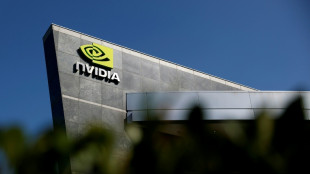
-
 Scott Boland: the best 'spare' fast bowler around
Scott Boland: the best 'spare' fast bowler around
-
Fire and Ashes: England bank on fast bowling barrage in Australia

-
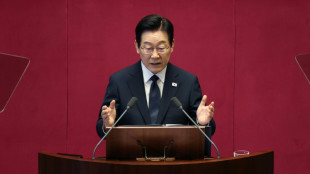 North Korea says Seoul-US sub deal will trigger 'nuclear domino' effect
North Korea says Seoul-US sub deal will trigger 'nuclear domino' effect
-
Education for girls hit hard by India's drying wells

-
 Haitian gangs getting rich off murky market for baby eels
Haitian gangs getting rich off murky market for baby eels
-
Trump says will talk to Venezuela's Maduro, 'OK' with US strikes on Mexico
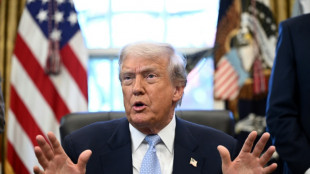
-
 Oscar Piastri wins Australia's top sports honour
Oscar Piastri wins Australia's top sports honour
-
'Severely restricted': Russia's Saint Petersburg faces cultural crackdown

-
 Polish PM denounces 'sabotage' of railway supply line to Ukraine
Polish PM denounces 'sabotage' of railway supply line to Ukraine
-
UK toughens asylum system with radical overhaul

-
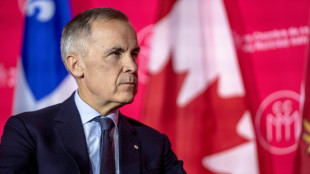 Carney's Liberals pass budget, avoiding snap Canada election
Carney's Liberals pass budget, avoiding snap Canada election
-
LeBron back in training, edges closer to Lakers return

-
 Climate talks run into night as COP30 hosts seek breakthrough
Climate talks run into night as COP30 hosts seek breakthrough
-
Germany and Netherlands lock up World Cup spots in style

-
 Germany's Woltemade hopes for 2026 World Cup spot after scoring again
Germany's Woltemade hopes for 2026 World Cup spot after scoring again
-
Germany 'send message' with Slovakia rout to reach 2026 World Cup

-
 Trump unveils fast-track visas for World Cup ticket holders
Trump unveils fast-track visas for World Cup ticket holders
-
Netherlands qualify for World Cup, Poland in play-offs

-
 Germany crush Slovakia to qualify for 2026 World Cup
Germany crush Slovakia to qualify for 2026 World Cup
-
Stocks gloomy on earnings and tech jitters, US rate worries

-
 'In it to win it': Australia doubles down on climate hosting bid
'In it to win it': Australia doubles down on climate hosting bid
-
Former NFL star Brown could face 30 yrs jail for shooting case: prosecutor

-
 Fate of Canada government hinges on tight budget vote
Fate of Canada government hinges on tight budget vote
-
New research measures how much plastic is lethal for marine life

-
 Mbappe, PSG face off in multi-million lawsuit
Mbappe, PSG face off in multi-million lawsuit
-
EU defends carbon tax as ministers take over COP30 negotiations

-
 McCartney to release silent AI protest song
McCartney to release silent AI protest song
-
Stocks tepid on uncertainty over earnings, tech rally, US rates

-
 Louvre shuts gallery over ceiling safety fears
Louvre shuts gallery over ceiling safety fears
-
'Stranded, stressed' giraffes in Kenya relocated as habitats encroached

-
 US Supreme Court to hear migrant asylum claim case
US Supreme Court to hear migrant asylum claim case
-
Western aid cuts could cause 22.6 million deaths, researchers say

-
 Clarke hails Scotland 'legends' ahead of crunch World Cup qualifier
Clarke hails Scotland 'legends' ahead of crunch World Cup qualifier
-
S.Africa says 'suspicious' flights from Israel show 'agenda to cleanse Palestinians'

-
 South Korea pledges to phase out coal plants at COP30
South Korea pledges to phase out coal plants at COP30
-
Ex-PSG footballer Hamraoui claims 3.5m euros damages against club


Global matcha 'obsession' drinks Japan tea farms dry
At a minimalist Los Angeles matcha bar, powdered Japanese tea is prepared with precision, despite a global shortage driven by the bright green drink's social media stardom.
Of the 25 types of matcha on the menu at Kettl Tea, which opened on Hollywood Boulevard this year, all but four were out of stock, the shop's founder Zach Mangan told AFP.
"One of the things we struggle with is telling customers that, unfortunately, we don't have" what they want, he said.
With its deep grassy aroma, intense color and pick-me-up effects, the popularity of matcha "has grown just exponentially over the last decade, but much more so in the last two to three years," the 40-year-old explained.
It is now "a cultural touchpoint in the Western world" -- found everywhere from ice-cream flavor boards to Starbucks.
This has caused matcha's market to nearly double over a year, Mangan said.
"No matter what we try, there's just not more to buy."
Thousands of miles (kilometers) away in Sayama, northwest of Tokyo, Masahiro Okutomi -- the 15th generation to run his family's tea business -- is overwhelmed by demand.
"I had to put on our website that we are not accepting any more matcha orders," he said.
Producing the powder is an intensive process: the leaves, called "tencha," are shaded for several weeks before harvest, to concentrate the taste and nutrients.
They are then carefully deveined by hand, dried and finely ground in a machine.
- 'Long-term endeavor' -
"It takes years of training" to make matcha properly, Okutomi said. "It's a long-term endeavor requiring equipment, labor and investment."
"I'm glad the world is taking an interest in our matcha... but in the short term, it's almost a threat -- we just can't keep up," he said.
The matcha boom has been fuelled by online influencers like Andie Ella, who has more than 600,000 subscribers on YouTube and started her own brand of matcha products.
At the pastel-pink pop-up shop she opened in Tokyo's hip Harajuku district, dozens of fans were excitedly waiting to take a photo with the 23-year-old Frenchwoman or buy her cans of strawberry or white chocolate flavored matcha.
"Matcha is visually very appealing," Ella told AFP.
To date, her matcha brand, produced in Japan's rural Mie region, has sold 133,000 cans. Launched in November 2023, it now has eight employees.
"Demand has not stopped growing," she said.
In 2024, matcha accounted for over half of the 8,798 tonnes of green tea exported from Japan, according to agriculture ministry data -- twice as much as a decade ago.
Tokyo tea shop Jugetsudo, in the touristy former fish market area of Tsukiji, is trying to control its stock levels given the escalating demand.
"We don't strictly impose purchase limits, but we sometimes refuse to sell large quantities to customers suspected of reselling," said store manager Shigehito Nishikida.
"In the past two or three years, the craze has intensified: customers now want to make matcha themselves, like they see on social media," he added.
- Tariff threat -
Anita Jordan, a 49-year-old Australian tourist in Japan, said her "kids are obsessed with matcha."
"They sent me on a mission to find the best one," she laughed.
The global matcha market is estimated to be worth billions of dollars, but it could be hit by US President Donald Trump's tariffs on Japanese products -- currently 10 percent, with a hike to 24 percent in the cards.
Shortages and tariffs mean "we do have to raise prices. We don't take it lightly," said Mangan at Kettl Tea, though it hasn't dampened demand so far.
"Customers are saying: 'I want matcha, before it runs out'."
At Kettl Tea, matcha can be mixed with milk in a latte or enjoyed straight, hand-whisked with hot water in a ceramic bowl to better appreciate its subtle taste.
It's not a cheap treat: the latter option costs at least $10 per glass, while 20 grams (0.7 ounces) of powder to make the drink at home is priced between $25 and $150.
Japan's government is encouraging tea producers to farm on a larger scale to reduce costs.
But that risks sacrificing quality, and "in small rural areas, it's almost impossible," grower Okutomi said.
The number of tea plantations in Japan has fallen to a quarter of what it was 20 years ago, as farmers age and find it difficult to secure successors, he added.
"Training a new generation takes time... It can't be improvised," Okutomi said.
K.AbuTaha--SF-PST


